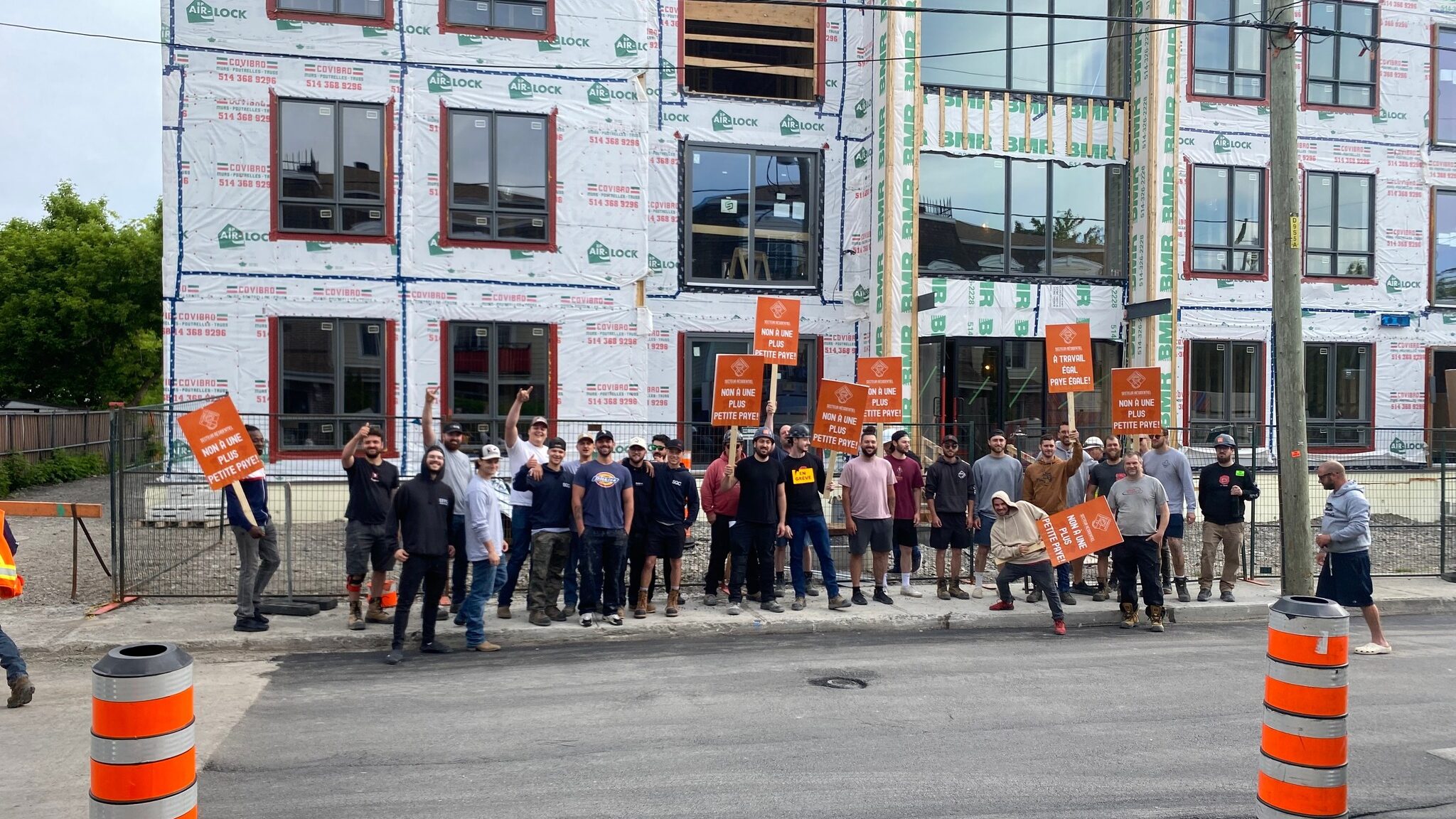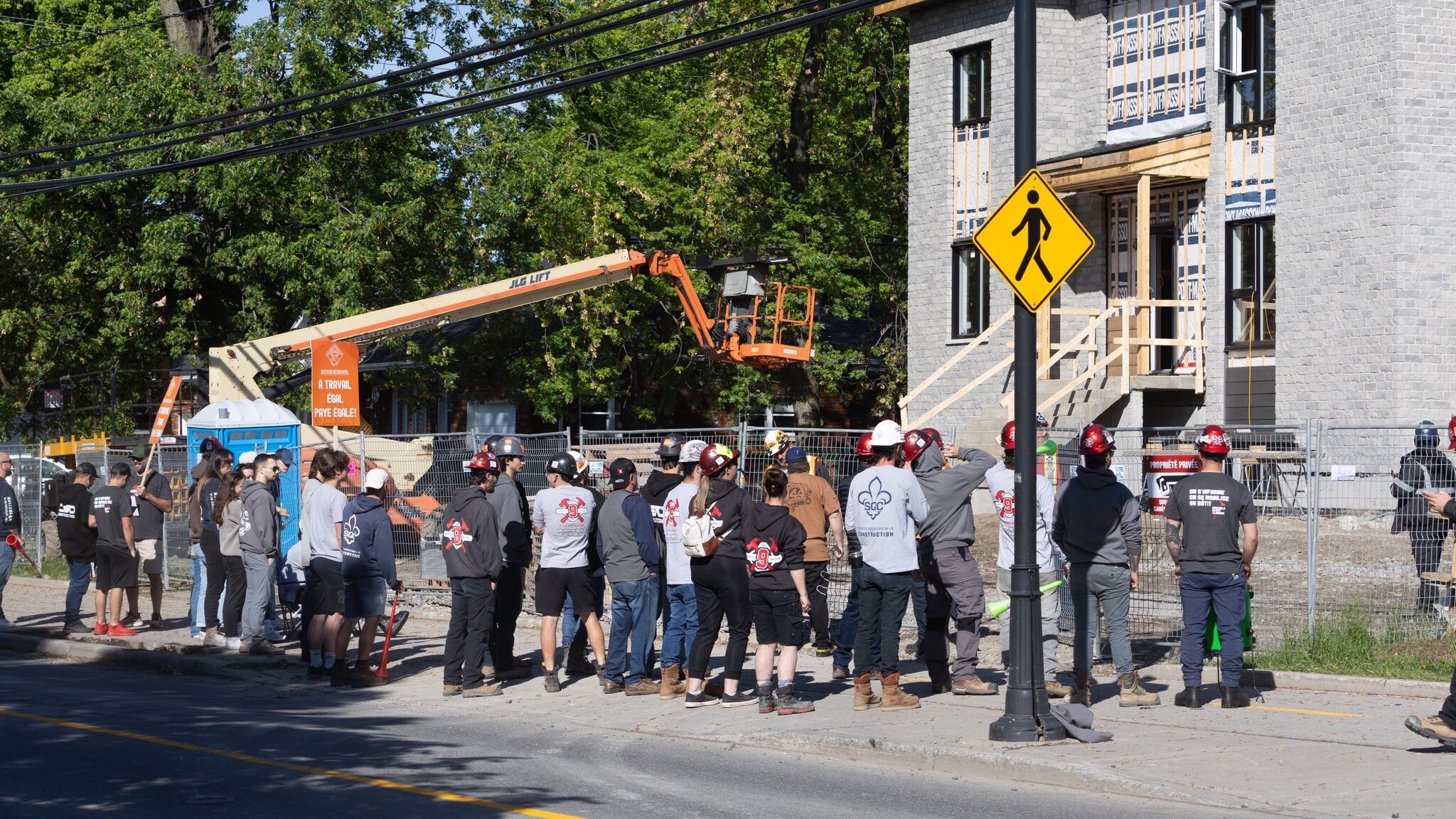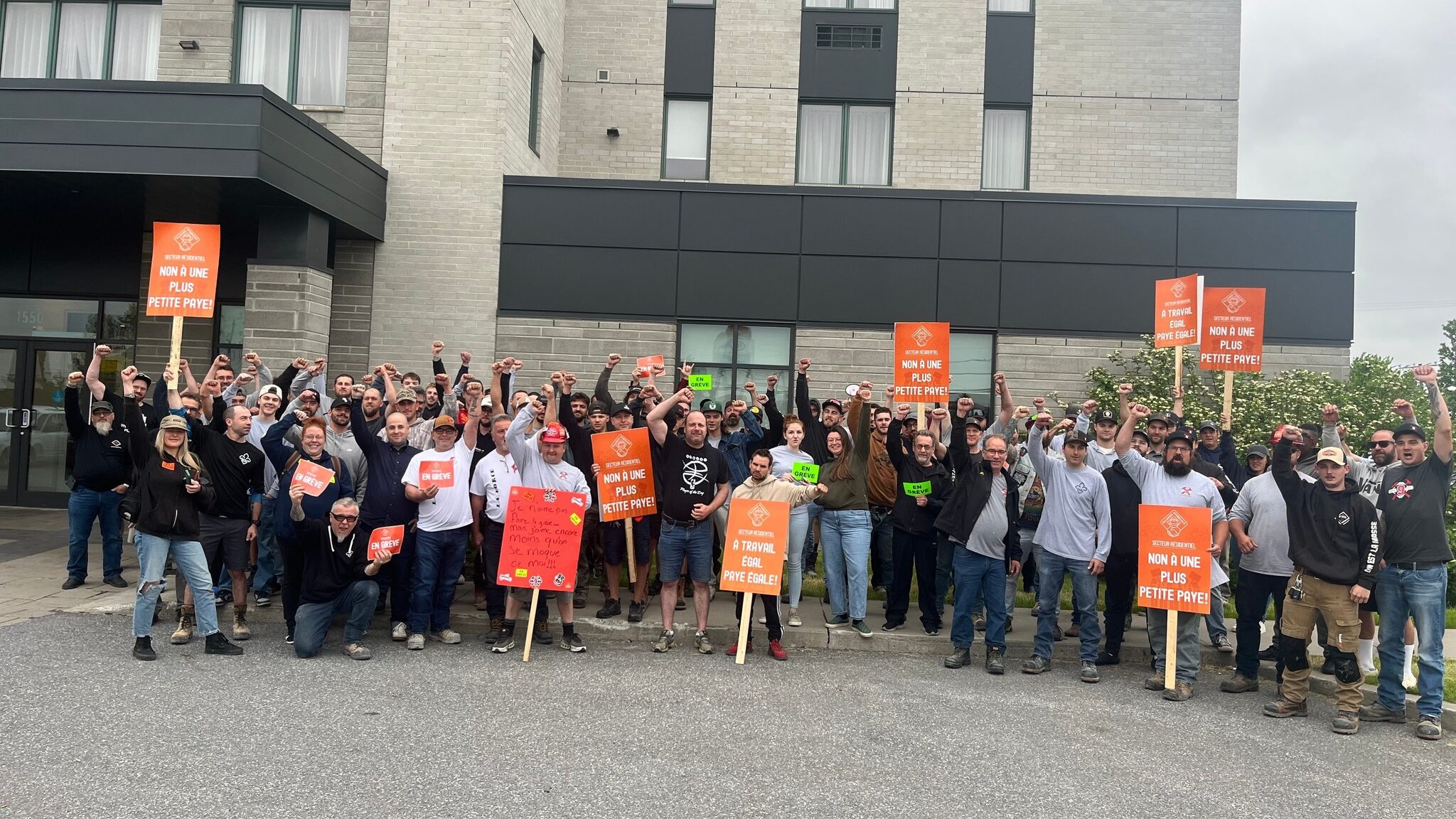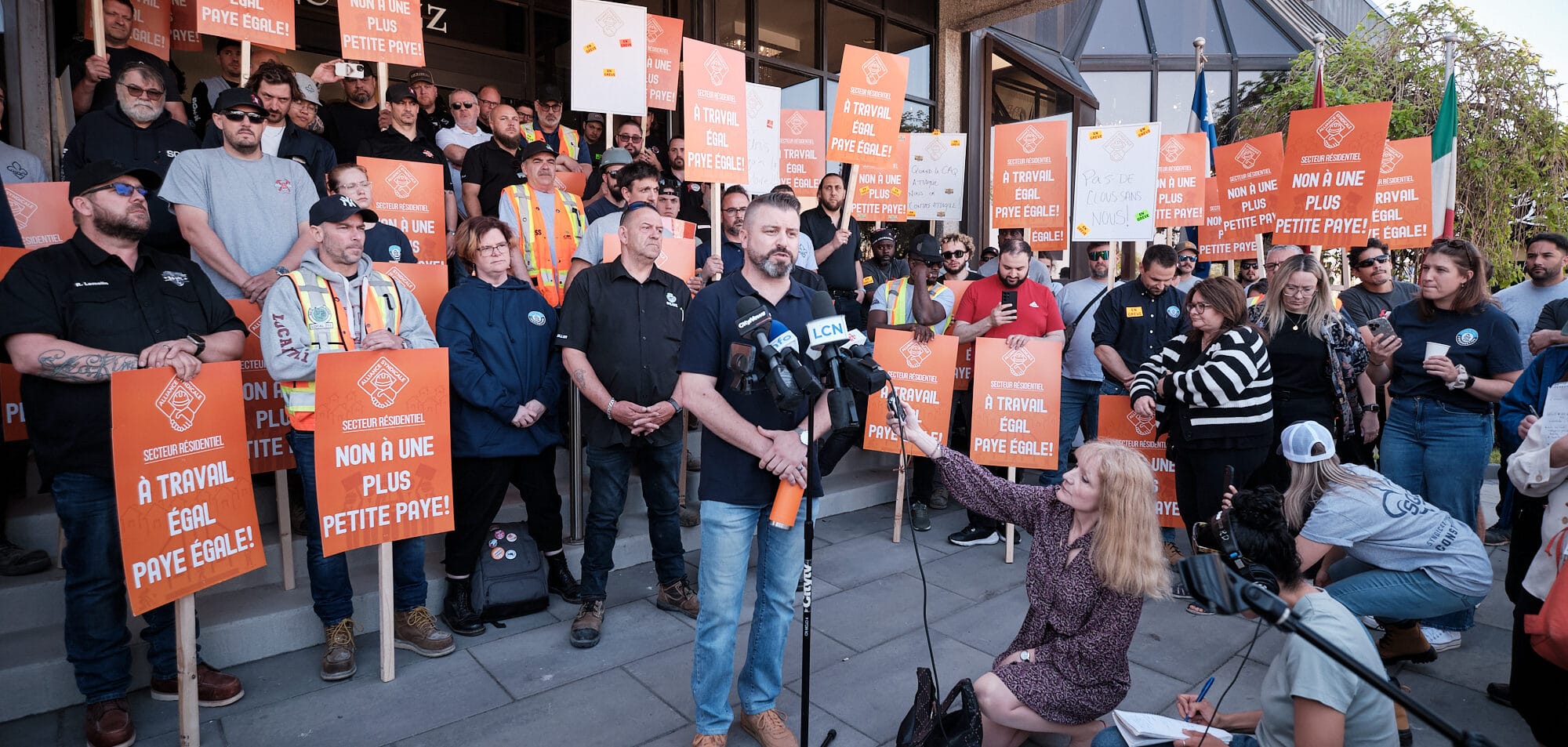High tensions, media hit pieces, and threats of back-to-work legislation—the first week of the strike in Quebec’s residential construction sector has been eventful. Workers in the province have been on strike since last Wednesday, with thousands taking part in rolling picket lines to shut down worksites and encourage other workers to exercise their strike mandate.
The residential sector is the only one in Quebec’s construction industry still without a new collective agreement since all four expired on April 30. The province’s five unions are united under the Union Alliance. Talks between the Union Alliance and the APCHQ, the sector’s employer association, have stalled, leaving the Alliance no choice but to use its strike mandate, backed by 83.8% of members.

A strike difficult to enforce fully
The North Star spoke with Marie-France Doré, a tiler based in Quebec City who has worked in the industry for five years and is unionized with CSN–Construction. Doré finds it unjust that the residential sector workers are paid less than in the commercial or institutional sectors. That’s what prompted her to get involved: “I need to go protest, even if it bothers my boss, even if I’m the only one.”
In Sherbrooke, residential carpenter JF Tremblay reports that around 250 people took part in each of the first two days. “The vibe on the picket lines is good. People are keeping each other motivated,” he says. Picketing lasted four hours on Friday morning, keeping morale high throughout the day.
Since there are over 28,000 residential companies in Quebec, many on multiple worksites, the effort to mobilize workers to strike is monumental. Companies and workers aren’t legally obligated to stop working during the strike, so the responsibility to enforce the strike tends to fall on the militants of the Union Alliance. They have been visiting residential worksites to inform workers and encouraging them to exercise their right to strike.
“People are actually pretty receptive. They get it,” explains Andreea Craciunescu, a carpenter in Montreal who is unionized with the CSN–Construction and primarily works on residential sites. Craciunescu is also a member of the CASCQ, the construction workers’ caucus of Workers’ Alliance, a Quebec-based labour organization.
During her visits, she realized that many workers were unaware that they were on strike. “That really shows a lack of mobilization. Obviously, if no one’s in the loop, no one can follow through with the strike call or the union’s directive. It all starts with information,” she remarked.

Doré also ran into similar issues of a lack of information when she went out to talk to workers on smaller residential worksites in her area when the strike first started last Wednesday:
“Those folks were basically in favour of the strike. If they stayed on the job sites, it was really just about money. Most of them supported us and were even thinking about joining the strike. But they didn’t know where to go, how to join in, or why. So, things were a bit confusing on Wednesday.”
But when she joined up with the Union Alliance at a meet-up point in Quebec City and went out to larger residential worksites, she was faced with a very different reception:
“People were really mad at us. They were yelling insults. We were out there for them, but they were upset because we were stopping them from working. The answer we got was: ‘Well, we’re getting paid commercial rates. We don’t care. We just want to work.’”
Many residential companies now pay the same wages as commercial ones in an attempt to retain workers. Residential sites are already seeing an exodus to commercial, institutional, industrial or civil engineering and road work sectors, which secured 22% raises over four years. The wage gap between residential and other sectors now ranges from 6.5% to 14%, depending on the trade.
“That’s why I found it so strange that the APCHQ didn’t want to put their offer to a vote, because I think it would’ve passed. So, what are their real intentions? We don’t know,” says Craciunescu.
APCHQ refuses to vote
One of the Union Alliance’s recent demands was for the APCHQ to put the union’s offer to a vote among its 28,000 members, as the Union Alliance did. With 90% of employers in the other sectors backing a similar deal and most residential workers already earning commercial wages, the Alliance suspects that many residential employees would support the current offer.
Instead of putting the offer to a vote, the APCHQ made a counteroffer of an 18% wage increase over four years, which the Union Alliance refused to submit to members. The APCHQ also spread false claims on their website, saying union representatives may not access worksites. This is contradicted by their collective agreement.
This misinformation led to tense confrontations last week. A video from residential construction company Gestco shows a site manager pushing and threatening a union rep trying to enter their worksite.
“Bosses do their job. They protect their own interests. They do their lobbying. They play the boss’s game, and they do what they have to do. The problem is, there’s no one on the other side pushing back. And that’s risky,” said Tremblay of the misinformation campaign.

Massive media offensive
The information war has also been playing out in Quebec media. Columnists like La Presse’s Marie-Eve Fournier have been attacking construction workers for fighting for better wages, calling them “poorly educated men who just want to get richer.“””
“I read Marie-Eve Fournier’s piece where she used a feminist angle to try and delegitimize the residential strike,” says Craciunescu. “At no other point did she seem concerned about those issues. She only brings them up to attack the legitimacy of the strike.”
Labour Minister Jean Boulet has also spoken against the strike, hanging the threat of a back-to-work order over the heads of residential workers, claiming: “We can’t afford to be patient in the current housing context. I expect it to last as short as possible, in everyone’s interest.”
Craciunescu deplores the fact that Boulet shows concern about the housing crisis only to discredit the strike. “What really frustrates me is that he’s blaming the workers who are just trying to improve their living conditions, instead of looking at the real causes behind the housing crisis. I’m thinking of things like real estate funds, developers, the profit margins of major contractors and so on,” she continues.
A back-to-work order on the horizon?
“If they bring in anti-strike laws or whatever, well, we’ll just have to go on strike anyway, even if it’s not legal. Striking is our only way to stand up for ourselves. Back-to-work law or not, I think we can still show up and disturb,” says Doré.
Tremblay agrees: “I’d be curious to see how we can challenge it or keep taking action even under a back-to-work law.”
“It’s the usual playbook. Every time there’s a strike in the sector, they pass a back-to-work law. It’s not surprising, it’s just how it goes. And with our own Labour Code, we’re even more limited in what we can do,” Craciunescu emphasizes.
She points out that the strike is the workers’ only source of leverage over their employers. She also notes that Bill 89 would expand the Minister’s power to shut down strikes across all unions. And yet, she says, the right to strike is recognized as a fundamental right in Canada.

Some workers hungry for more
The Union Alliance has responded to the media attacks and denounced Jean Boulet’s comments. Tremblay doesn’t think this is sufficient: “The media narrative is one thing, but our power isn’t in the media. It’s in the people. Our members should’ve been prepared, or should be prepared, so that internally we can help them understand what we’re fighting for. We were talking about class consciousness, getting people to really see what’s going on and why this fight is justified.”
Doré, too, expected more from the Union Alliance’s strike strategy: “We’re too passive. People practically laugh at us because we’re not making an impact. That’s why I think the Union Alliance should show up more.”
She continues: “This strike should’ve been planned further ahead. Workers should’ve been better informed. We should’ve had more info so we could have greater participation and make a bigger impact. So, did they go too far? No, the opposite. They could’ve gone even further. Even now, there’s more they could do.”
Craciunescu believes that, despite the challenges of inter-union coordination, a stronger mobilization could have been achieved ahead of the strike. “I also think there are folks who want to push things further on their own initiative. That’s actually why the CASCQ exists. It’s a space that brings people together from different unions,” Craciunescu says.
“Anyone connected to the construction industry, even indirectly, can get involved, talk about the issues, help with organizing, and so on. This kind of space exists because we don’t have room to do that within the traditional union structures,” she continues.
“This strike means a lot to me,” Doré concludes. “We deserve support, because we’re doing this for the future of housing construction, for the future of Quebec.”


Be part of the conversation!
Only subscribers can comment. Subscribe to The North Star to join the conversation under our articles with our journalists and fellow community members. If you’re already subscribed, log in.